Home | Category: Muslim Education, Government and Finance
ISLAM AND GOVERNMENT

Constitutions of Muslim majority countries based on their religion status: 1) declared Islamic states (dark green) 2) declared Islam as the state religion (light green); 3) declared secular states (dark purple); 4) No constitutional declaration (light purple)
Islam is regarded by some as a social and political order as well as a religion. Theoretically the state and religious community are one—with both ideally being close collections of congregations united by conservative traditions. Egalitarian and non-authoritarian, Islam is organized on state level in some places and then the local mosque level, without much in between. The idea of separation of religion and the state never really caught on in the Muslim world. Secularism is viewed by many Muslims as a threat to Islam.
By contrast, politics had never been central to Judaism and Christianity. Early Jewish and Christian communities were used to living on the fringes of organized government. Christians looked for fulfillment with God in the next world. The community other than the church was not of central importance. Although at times they were quite powerful the Catholic and Orthodox churches usually co-existed with states rather than as states. Some liberal Muslim scholars maintain that Islam was originally a private faith that was not intended to be a guide for state matters. Sharia literally mean “the way.” Tao, as in Taosim, also means “the way.”
The Koran states: “Verily never will Allah change the condition of a people until they change it themselves.” The involvement of religious clerics in government has been justified by vague verses from the Koran that refer to a period in Mohammed’s time when there was little central political authority. Among these are: 1) “O you who believe! Obey God, the Prophet and those who have authority among you (Sura: 4:59). 2) “Whoever does not judge (or govern) by what God has reveled, Those are the unbelievers” (Sura: 5:44). 3) “And if any fail to judge (or govern) by what God has revealed, those are the Wrongdoers.” (Sura: 4:59).
In many Muslim countries—with Syria and Egypt high on the list — expressing strong Islamist ideas is frowned upon, even illegal. Some people from these countries who emigrated to the United States and Europe have been happy in their adopted countries to be able to fully express themselves and their religious beliefs and pass them on to their children without fear.
It can be argued that democracy and secularism never really took hold in Arab countries because the egalitarianism preached by the Prophet Muhammad has always been superceded by Arab tribalism. It has also been suggested that the Islamic concept of obedience to God alone runs contrary to the idea of democracy and the rule or man by other men. One conservative Muslim told the New York Times, “Basically Muslims live a different kind of life from the Western life, which is secular. Everything we do is governed by religious law.”
Questions relating to Islam and government being asked today include: Are secularism and Islam compatible? What roles, if any, should religious scholars have in politics? Who are the authorities in Islam? Can Islamic law be modified? Can doubts be expressed about Islam and if so what are the limits on which these doubts can be expressed.
Websites and Resources: Islam Islam.com islam.com ; Islamic City islamicity.com ; Islam 101 islam101.net ; Wikipedia article Wikipedia ; Religious Tolerance religioustolerance.org/islam ; BBC article bbc.co.uk/religion/religions/islam ; Patheos Library – Islam patheos.com/Library/Islam ; University of Southern California Compendium of Muslim Texts web.archive.org ; Encyclopædia Britannica article on Islam britannica.com ; Islam at Project Gutenberg gutenberg.org ; Islam from UCB Libraries GovPubs web.archive.org ; Muslims: PBS Frontline documentary pbs.org frontline ; Discover Islam dislam.org;
Sharia (Islamic Law): Oxford Dictionary of Islam oxfordislamicstudies.com ; Encyclopædia Britannica britannica.com ; Wikipedia Wikipedia ; Sharia by Knut S. Vikør, Oxford Encyclopedia of Islam and Politics web.archive.org ; Law by Norman Calder, Oxford Encyclopedia of the Islamic World oxfordislamicstudies.com ; Sharia Law in the International Legal Sphere – Yale University web.archive.org ; 'Recognizing Sharia' in Britain, anthropologist John R. Bowen discusses Britain's sharia courts bostonreview.net ; "The Reward of the Omnipotent" late 19th Arabic manuscript about Sharia wdl.org;
Qur’an (Quran, Koran) and Hadith:
Quran translation in English alahazrat.net ;
Quran in Easy English, Urdu, Arabic and 70 other languages qurango.com ;
Quran.com quran.com ;
Al-Quran.info al-quran.info ;
Quranic Arabic Corpus, shows syntax and morphology for each word corpus.quran.com ;
Word for Word English Translation – emuslim.com emuslim.com/Quran ;
Digitised Qurans in the Cambridge University Digital Library cudl.lib.cam.ac.uk ;
Sunnah.com sunnah.com ;
Hadith – search by keyword and by narrator ahadith.co.uk
RECOMMENDED BOOKS:
“Islamic Government” by Imam Khomeini Amazon.com ;
“Islam and Politics” by Mufti Taqi Usmani, Muhammad Isa Waley, et al. Amazon.com ;
“The Principles of State and Government in Islam” by Muhammad Asad and Gustave E Von Grunebaum Amazon.com ;
“Islamism and Islam” by Bassam Tibi Amazon.com ;
“Ibn Taymiyya (Makers of the Muslim World) by Jon Hoover Amazon.com ;
“Salafism and Traditionalism: Scholarly Authority in Modern Islam”
by Emad Hamdeh Amazon.com ;
“The Making of Salafism: Islamic Reform in the Twentieth Century” by Henri Lauzière Amazon.com ;
“Sayyid Qutb and the Origins of Radical Islamism” by John Calvert Amazon.com ;
“Milestones” by Sayed Qutb Amazon.com ;
“The Muslim Brotherhood: Evolution of an Islamist Movement” by Carrie Rosefsky Wickham Amazon.com ;
“Inside the Muslim Brotherhood: Religion, Identity, and Politics” by Khalil al-Anani Amazon.com ;
“Hizb ut-Tahrir: The Untold History of the Liberation Party”
by Reza Pankhurst Amazon.com ;
“Caliphate: The History of an Idea” by Hugh Kennedy Amazon.com ;
“What Is Religious Authority?: Cultivating Islamic Communities in Indonesia” by Ismail Fajrie Alatas Amazon.com ;
“Sharī'a: Theory, Practice, Transformations” by Wael B. Hallaq Amazon.com ;
“Introduction to Islamic Law: Principles of Civil, Criminal, and International Law under the Shari‘a” by Jonathan G. Burns Amazon.com ;
“Sharia Incorporated: A Comparative Overview of the Legal Systems of Twelve Muslim Countries in Past and Present” by Isabell Otto Amazon.com ;
“Fatwa and the Making and Renewal of Islamic Law: From the Classical Period to the Present”by Omer Awass Amazon.com ;
“The Four Juristic Schools: Their Founders, Development, Methodology & Legacy”
by Islamic Research Team Do Fatwa Kuwait Amazon.com
Sunnah on Government
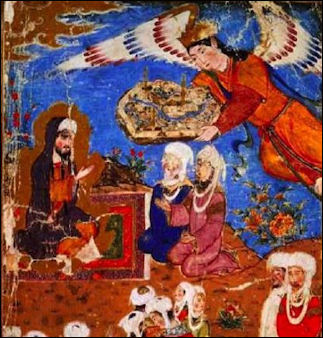
Angel presenting Mohammed with a town
The Sunnahs are the practices and examples drawn from the Prophet Muhammad's life. Along with the Hadiths they are the most important texts in Islam after the Qur’an. They must adhere to a strict chain of narration that ensures their authenticity, taking into account factors such as the character of people in the chain and continuity in narration. Reports that fail to meet such criteria are disregarded.
The Sunnah reads: “Government is a trust from God, and verily government will be at the day of resurrection a cause of inquiry, unless he who hath taken it be worthy of it and have acted justly and done good. Verily a king is God's shadow upon the earth; and every one oppressed turneth to him: then when the king doeth justice, for him are rewards and gratitude from his subjects: but, if the king oppresses, on him is his sin, and for the oppressed resignation. [Source: Charles F. Horne, ed., “The Sacred Books and Early Literature of the East”, (New York: Parke, Austin, & Lipscomb, 1917), Vol. VI: Medieval Arabia, pp. 11-32]
“That is the best of men who dislikes power. Beware! ye are all guardians; and ye will be asked about your subjects: then the leader is the guardian of the subject, and he will be asked respecting the subject; and a man is a shepherd to his own family, and will be asked how they behaved, and his conduct to them; and a wife is guardian to her husband's house and children, and will be interrogated about them; and a slave is a shepherd to his master's property, and will be asked about it, whether he took good care of it or not.
“There is no prince who oppresses the subject and dieth, but God forbids paradise to him. If a negro slave is appointed to rule over you, hear him, and obey him, though his head should be like a dried grape. There is no obedience due to sinful commands, nor to any other than what is lawful.
“O Prophet of God, if we have princes over us, wanting our rights, and withholding our rights from us, then what do you order us? He said, "Ye must hear them and obey their orders: it is on them to be just and good, and on you to be obedient and submissive." He is not strong or powerful who throws people down, but he is strong who withholds himself from anger. When one of you getteth angry, he must sit down, and if his anger goeth away from sitting, so much the better; if not, let him lie down.
Islam after Mohammed
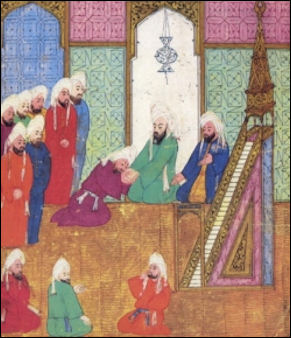
Abu Bakr, the first Caliph When Mohammed died the Muslim world was thrown into turmoil because there were no obvious successor since his only surviving children were daughters. To help Muslim keep the focus on what really mattered, Abu Bakr proclaimed: “O men if you worship Mohammed, Mohammed is dead; if you worship God, God is alive.
The was a great debate about what form Islam should take and how it should be organized. Some believed that each tribal group and community should be lead by imam, and that is high as high as the hierarchy should go. Others felt that Muslims need to be united as they were under Mohammed.
From the very beginning Islam had a political side that was not well defined and this has generated problems every since. The selection of first Caliph was carried out by the Medina Muslim community and was done without defining authority or rules of selection. The only guidance left for future generations were the laws of Islam itself, with no distinction being made between the religious and political aspects of the community. There never really has been a Muslim equivalent of separation of church and state.
Caliphs
The leaders that succeeded Mohammed were called Caliphs. Caliph is an Arabic that means "successor," "lieutenant" or "viceroy." It refers a supreme religious leader who is a descendent of Mohammed. They were powerful but they did not have the connection with divinity that Mohammed had. Additionally in the Muslim world, there were sultans, sovereigns of Muslim kingdoms.
Caliphs were not regarded as prophets or infallible interpreters of religious doctrines. They were religious and political leaders of the entire Muslim community and guardian of Muslim law and the Islamic holy sites. Their duty was to maintain peace and uphold the law in the Muslim community. Their qualifications included knowledge of religious laws and widely acknowledged virtuousness. It was also important for them to be linked by blood to Mohammed’s Quraysh tribe.
The first four Caliphs — Abu Bakr, Omar, Othman and Ali — were all from Mecca and all close friends or relatives of Mohammed. Later caliphs lived outside Arabia. They ruled over an empire that was considerably larger than the area that Mohammed presided over. Despite being greatly weakened after the 12th century caliphs endured for 1,300 years until the caliphate was abolished in 1924 by the leaders of modern secular Turkey.
Arab and Muslim Expansion
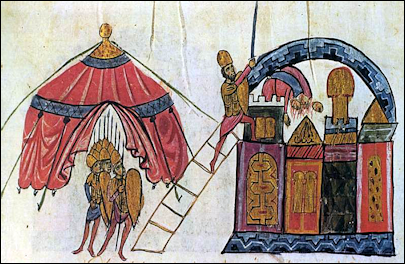
Fall of Antioch in 969 At the time of Mohammed's death, Islam was primarily a local phenomena. It was little noticed outside Arabia but within a 100 years after Mohammed’s death, it was the glue that held together an empire that stretched from the Atlantic Ocean and the Pyrenees in the west, and Himalayas in east, and was one of the greatest unifying force in the history of mankind. While Christianity was spread around the world by missionaries, Islam was mainly spread by conquering armies. This was the case not because of something particularly vicious or warlike about the Arabs or Muslims but rather because the areas the Arabs invaded were either weak or sparsely populated.
The so-called Arab invasions in the 7th century were among the least destructive in history. The Islamic conquest was not only speedy but permanent. Nearly all of the conquered territory remain Muslim today. You can't say that about the Roman, Persian or Mongol empires. Islam swept through the Middle East and North Africa, filing a void left by the anarchy and decadence of waning Byzantine rule. Byzantium at the time the Arabs conquered the Middle East in the 7th century was worn out from its battles with Avars and Persians and the plague and was not the empire it was two centuries earlier. The Persians had similar problems, and many of their subjects had grown weary of their rule.
Wherever the Muslims went they also carried with them Arab culture. The cultures of the assimilated territories, which included places occupied by Christians, Jews and Zoroastrians, were influenced by the religion and culture of the Arab invaders. The Arabic language and Arabic culture was spread with Islam. But even so a concept of ethnic nationalism, with a common language, never really developed, nor did the notion of territorial nations defined by formal borders. What existed were mainly Muslim-ruled cities and their hinterlands.
The conquered people were subjugated politically but over time their culture, customs, administrative practices, arts and world view transformed their conquerors. The process continues today. In the early years it was common for non-Arabs to convert to Islam and at the same time become an Arab by forming a relationship with an Arab tribe. Later on converting to Islam and become an Arab became a separate process.
Islamic Structure and Organization
Islam is a heterogeneous religion that recognizes no authoritative source of doctrinal interpretation like the Pope. The lack authoritative source of doctrinal interpretation means that Islam lacks a hierarchal structure like the Catholic church and anyone can interpret the Koran and other religious scriptures anyway they like. This makes Islam more egalitarian and democratic in some ways but also makes it easier for Muslim extremists to gain influence and promulgate their views.
Muslims believe in direct communion with God and technically human intermediaries are not necessary for followers to have a relationship God. Even Mohammed was only a messenger. Consequently there are no priests, popes, holymen or saints in Islam. Every Muslim has equal access to God and any Muslim of good character can be the leader of prayers at a mosque.
Islam has no “clergy” in the Christian sense. There is no concept of a “church.” No sacraments. Islam has “rigorously excluded from its religious leadership any of the spiritual functions and prerogatives of a priesthood.” The basis of some of Islam's structures is rooted in Bedouin traditions of blood kinship, egalitarianism and surrendering to strong authority (Allah in the case of Islam).
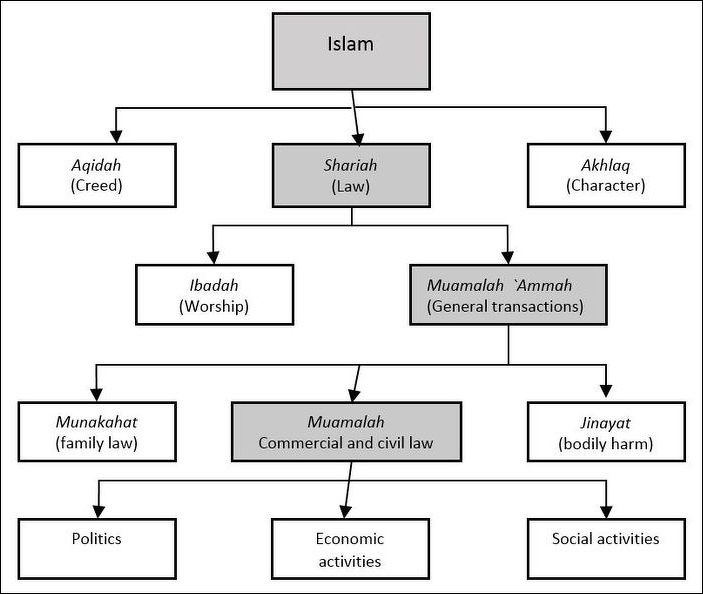
Islamic organizational chart, muamalat
Shiite Islam is regarded as more organized and hierarchal than Sunni Islam. Vali Nasr, author of the The Shia Revival , compares Shiites to Catholics because of their emphasis on religious hierarchy, mysticism, worship of a holy family (the Prophet’s descendants) and clerical intercession while the Sunnis are like Protestants with their lack of a unified clerical establishment and reliance on original texts, namely the Koran and the Sunnah, as the sect’s authority of religious questions.
Islamic Community, Imam and Sheiks
The local Islamic community is known as the umma . More like a club than an organized church, it is involved in a number of community and charity activities and is "entrusted with the furtherance of Good and repression of Evil." Only Muslims are allowed to be members of the Muslim community. Members are called mukallag which means “one who is required to fulfill his religious duties and observances in accordance with sharia.”
The local Islamic community is supposed to be "a single hand, like a compact wall whose bricks support each other." Leaders in Muslim societies have traditionally greeted all comers in a pavilion to read petitions, hear grievances and mete out justice.
An imam is the spiritual head of a Muslim community. The imam at a mosque is simply a teacher, a learned person or a prayer leader. Every mosque has an imam and an assistant imam that takes the place of the imam if he is sick or out of town, or steps in if the imam stumbles or forgets a verse.
Imam have traditionally lead prayers and sometimes made sermons. Leading the mosque in prayers is regarded as a great honor. Some imam are self appointed and have little formal religious training. Some are fundamentalists who bully their way into their positions or draw on the support of Muslim extremists. Often they are consulted on matters for which they receive little training such as arranged marriages and mediating disputes between vendors.
Sheik means teacher. It is the name given to a man admired for his piety. Sheiks are sometimes imam or preachers. They are often also chiefs, village leaders or even the leader of a large tribe or nation. Many villages have an elder spiritual leader who is regarded as the keeper of the Koran.
A khatib is a Muslim preacher or orator. In the old days he often carried a preaching staff and began his sermons with blessing for Allah, the Prophet and his family and then the current political leader. A hafiz is a man who has memorized the Koran.
Clerics, Mullahs, Qadis and Muftis
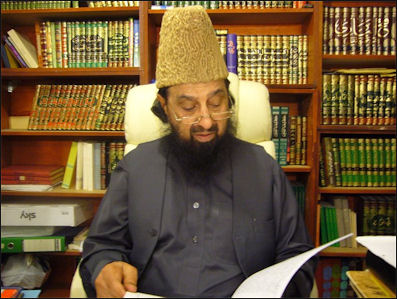
Sheikh Syed Abdul Qadir Jilani
"Mullah" is an honorific word for a learned person who acts a teacher and judge and who expounds Muslim law. He is regarded more like a high-ranking professor of the religion rather than a priest. Mullah is term most often used in Iran and Shiite countries. A person generally needs to finish a Koranic school to obtain that title of mullah. Most mullahs live relatively modestly.
“Ulama” refers to a class of mullah or religious scholars that are trained in theology and are respected interpreters of the Koran. Influential in conservative and rural communities, many ulama can trace their lineage back to the Prophet or members of his family or his early followers. In the past they often formed the urban elite. They and the children were educated the most prestigious madrasahs (Muslim schools). Ulama is the plural of alim (“scholar”).
A Muslim judge is known as a cadi ( qadi ). A mufti is an Islamic legal expert. They began as assistant to judges, Now many are high ranking legal experts allowed to issue fatwas. See Fatwas, Muslim Law.
Beginning in the 10th century special academies were set up for teaching religious and legal doctrines. Al-Azhar, the world’s oldest functioning university, was one of these. Muslim religious training often takes around a dozen years and begins in the early teens. Students learn techniques of preaching. Studying to be a cleric has traditionally been a way on which a young man from a poor or middle class family could improve his station in life.
Respected clerics typically give a sermon at Friday prayers . They also give lectures and conduct question and answer sessions at mosques of religious schools. Religious jobs today are generally low paying. One madrassah teacher told Foreign Policy magazine: “You don’t want to be a mullah like me, with little pay and no respect on the eyes of the rich and powerful.”
Problems with the Relationship Between Islam and Government

Religious scholar Kenneth Woodward wrote in Newsweek:”Muslims have never resolved the tension between religious authority and Islamic governments. When Islam was a great medieval civilization, jurists learned in the Koran decided how to apply God’s words to changed historical situations. Their “fatwas” settled disputes...But in today’s Islamic states, authoritative religious voices do not command widespread respect. Like freewheeling fundamentalists of every religious stripe, any Muslim with an agenda now feels free to cite the Koran in his support. Osama bin Laden is only the most dangerous and obvious example.”
Islam, as it is interpreted by conservative Muslims, is at odds with secularism. It instructs the faithful to follow their Islamic leaders, discourages free choice, and suppress women’s rights, education and law. In much of the Muslim world religion and the state overlap. Even the most ardent secularist from time to time bow to the wishes of religious leaders. There is an assumption among conservative Muslims that only God can make laws for men to follow. For men (i.e. politicians) to make laws is a kind of apostasy. One conservative Muslim told the New York Times, “Basically Muslims live a different kind of life from the Western life, which is secular. Everything we do is governed by religious law.”
Some liberal Muslims believe a goal should be to create a secular Muslim society that “respects religion but doesn’t tolerate fanaticism.”
Muslim Authorities
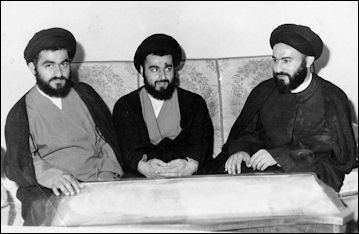
Shiite clerics
Since the abolishment of the caliphate and deposition of the last caliph in 1924 Sunni Islam has had a serious void of central leadership and no one to speak as its authority. Issues instead have been debated by different groups of scholars and jurists that often had competing agendas and interpretations of Islamic scripture.
Al Azhar in Cairo is regarded as the most important religious center in the Sunni Muslim world. Founded in A.D. 970, it is also considered the world's oldest still-functioning university. The Grand Sheik (leader) of Al Azhar is regarded by many as the top Islamic authority in the world. His declarations and opinions on matters ranging from Israel to birth control are given much weight. The only catch is that he is appointed by the Egyptian government and conservative Islamists don't like that.
The Grand Mufti is the second-highest ranking cleric and a subsidiary figure who holds a set in the Egyptian government. Al-Azhar contains a Islamic Research and a Fatwa House, which reports directly to the Grand Mufti.
Grand Mufti Sheik Abdul-Aziz al-Sheik is Saudi Arabia’s top religious authority. He is the head of the Council of Ulemas, made up of senior Islamic scholars. The members are selected by the council with the approval of the king. The regard themselves as the guardians of society and uphold of Islamic morality. Saudi Arabia’s Grand Mufti once announced that the world was flat and has banned Pokemon on the grounds it is harmful to Islam.
Bringing Back the Caliph
One of the goals of Al-Qaida and other Islamist groups — and some moderate Muslims too — has been to restore the caliphate, the rule of Islamic clerics. The caliphate formally ended in 1924, after the dissolution of the Ottoman Empire, but it hadn’t exercised real power since the thirteenth century. A caliph is a successor to the Prophet.
In November 1922, the Turks abolished the sultan, who was regarded as the caliph, the leader and unifier of all Sunni Muslims and the last of a line of rulers that dated back to Mohammed. In A.D. 632. There was a brief experiment with a separate caliph but that didn’t work out. In March 1924, the caliphate was abolished. With the deposition of the last caliph in 1924, Islam had no one to speak as its authority. Issues instead were debated by different groups of scholars and jurists that often had competing agendas and interpretations of Islamic scripture.
Carl Vick wrote in the Washington Post: “Caliph, from the Arabic word khalifa , means successor to the prophet Muhammad. Competition for the title caused the schism between Shiite and Sunni lines of the faith, and the Shiites soon stopped selecting caliphs. But in the dominant Sunni tradition, the office embodied the ultimate religious and political authority, enabling Ottoman sultans to hold together an empire across three continents for more than 500 years” when the Caliph was based in Istanbul. [Source: Carl Vick, Washington Post, January 14, 2006]
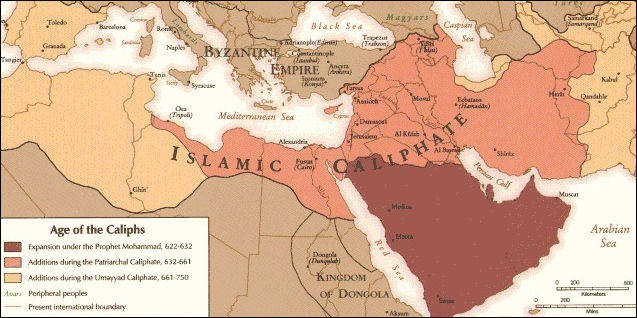
“The last caliph, an urbane scholar, Abdulmecid Efendi, was unseated in March 1924 by Mustafa Kemal Ataturk, the charismatic military officer who conceived modern Turkey as an exemplar of the system that places sovereignty in the nation-state rather than faith. Importing from France the notion that religion had no place in public life, Ataturk decreed that Islamic religious law was second to "the rule of law" by the state.... Ataturk appealed to Muslim solidarity in the battle to drive European powers off the Anatolian peninsula after World War I and the fall of the Ottoman Empire. But while Turks won self-rule, most of the former caliphate was divided among European colonial powers. One Arab scholar called it "the division of Muslim lands into measly pieces which call themselves nations."
This is what inspired the group most directly focused on the push for a new caliphate, Hizb ut-Tahrir, or Party of Liberation. The group, which claims to be active in 40 countries, began in 1953 as an offshoot of the Muslim Brotherhood. But while the Brotherhood, which also favors a caliphate, embraced realpolitik, growing into a potent opposition force in Syria and Egypt, Hizb ut-Tahrir charted a more subversive path.
Serif Mardin, a leading Turkish scholar on political Islam, told the Washington Post: "A sweet caliph of ancient times is overwhelmed by this modern military idea. I mean, the caliph is supposed to be a nice guy. On how jihadists and Muslim extremists have framed the idea of the Caliphate, Mardin said, “These are the terrible simplifiers of Islam, and I'm not sure this simplification of Islam really 'takes' on all social levels."
"I wish there was a caliphate again, because if there was a caliphate all the Muslims would unite," said Ertugul Orel, a shop owner in Istanbil told the Washington Post. "There would be one voice. But I know neither the American nor the Europeans will ever allow it." Another shop owner, Atacan Cinar, added, "Before the end of the Ottoman Empire, there was no problem in the Islamic countries." "The concept of the caliphate is very much alive in the collective memory of society," said Ali Bulac, a columnist and author of several books on Islam and Turkey. "There is absolutely nothing to keep Muslim society together at the moment."
Pan- Islamic Movement and the Caliphate
Some Muslim groups have said one of their goals is to establish a pan-Islamic caliphate throughout the world under Islamic law (sharia), with a single Caliph as its leader. During the caliphate period the Islamic world was unified under the leadership of the caliph the same way the Roman Catholic has been unified under the Pope.
Carl Vick wrote in the Washington Post: The goal of reuniting Muslims under a single flag stands at the heart of the radical Islamic ideology. Bush and other American conservatives have warned of it repeatedly. When Osama bin Laden called the Sept. 11 attacks on the World Trade Center and the Pentagon "a very small thing compared to this humiliation and contempt for more than 80 years," the reference was to the aftermath of World War I, when the last caliphate was suspended as European powers divided up the Middle East. Al Qaeda named its Internet newscast, which debuted” in 2005, "The Voice of the Caliphate."[Source: Carl Vick, Washington Post, January 14, 2006]
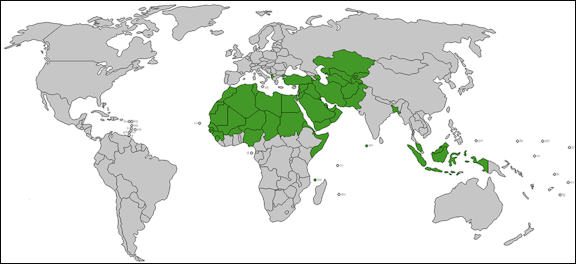
Muslim majority countries
“Yet the caliphate is also esteemed by many ordinary Muslims. For most, its revival is not an urgent concern. Public opinion polls show immediate issues such as the Israeli-Palestinian conflict and discrimination rank as more pressing. But Muslims regard themselves as members of the umma , or community of believers, that forms the heart of Islam. And as earthly head of that community, the caliph is cherished both as memory and ideal, interviews indicate. "Why do you keep invading Muslim countries?" asked Kerem Acar, a tailor in central Istanbul. "I won't live to see it, and my children won't, but one day maybe my children's children will see someone declare himself the caliph, like the pope, and have an impact." [Ibid]
Robert Hunt of the Dallas Morning News wrote, “There has been a persistent strain of millennialist imperialism withing the larger history of Muslim societies. There has always been Muslims who believe their destiny and that their religion is to finally overcome the ignorant and evil half of the world that has not yet submitted to God as revealed by the Koran.For most of Islamic history, the millennial empire building gas been displaced by pragmatic agendas of political, military and economic expansion. Actual Muslim empires ultimately abandoned their religious agendas out of both self interest and weakness.”
Harvard political scientist Samuel Huntington, famous for suggesting that differences and conflicts between Islamic and Western societies is based on a “clash of civilizations,” told Islamica magazine: “Certainly there are various trans-Islamic political movements, which try to appeal to Muslims of all societies. But I’m doubtful that there will be any sort of real coherence of Muslim societies as a single political system run by elected r non-elected leaders. But I think we can expect Muslim societies to cooperate with each other on many issues just as Western societies cooperate with each other. I would not rule out the possibility of Muslim, or at least Arab, countries developing some form of organization comparable to the European Union.”
Book: Islamic Imperialism by Efraim Karsh (Yale University Press, 2008)
Islam’s Crisis of Authority
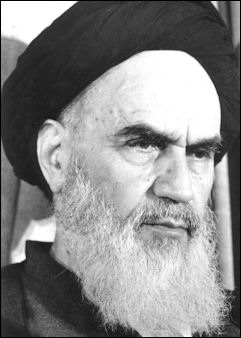
Ayatollah Khomeni In an article in the Wilson Quarterly, Columbia University historian Richard Bulliet argued that “a crisis of authority had been building in Islam for more than a century” and is the product of religion’s decentralized and weak authority structures which in turn have undermined the power of the traditional ulema (the leading Muslim scholars) who were once able “to disqualify or overrule a man who does not speak — or act — for Islam.” [Source: Jay Tolson, U.S. News and World Report, April 16, 2007]
Bulleit argues tat there are three reason for this: 1) the gradual marginilization of the leading sheiks and muftis because of their closer relationship with authoritarian regimes that control the purse strings to important mosques; 2) the emergence of self-proclaimed authorities with little traditional learning but with superior mastery of the media; and 3) increased literary which has created a huge and receptive audience for new voices [Ibid]
There have been other crises of authority in the past such as when the four main schools of Islam emerged out a anarchic and chaotic proliferation of viewpoint and ideology in medieval times. The main sources today are: 1) the Muslim diaspora in Europe and North America, that includes of Switzerland-based Tariq Ramadan and Iranian-born and Netherlands-based Afshin Elain; 2) activists at universities in predominately Muslim countries outside the Middle East that combines traditional religious studies and with modern studies; and 3) Islamic political parties.
Book: Islamic Imperialism by Efraim Karsh (Yale University Press, 2008).
Zakat
The third pillar of Islam, zakat (almsgiving), is required of all Muslims. The faithful are expected to give in proportion to their wealth. In various historical periods, zakat assumed the status of a tithe that mosques collected and distributed for charitable purposes. In addition to zakat, Muslims are encouraged to make free-will gifts (sadaka , from the Arabic sadaqa ).*
Zakat generally involves giving away a certain percentage of one's income and savings to the poor.It is regarded as a form of worship and an expression of sympathy and a sharing in God's blessing. It has traditionally been practiced in association with Ramadan, when the rich traditionally held feasts for the poor, but today is very institutionalized and resembles paying taxes, with government and mosque bureaucracies collecting much of the money and dispensing it as a kind of welfare.

slot at the Zaouia Moulay Idriss I in Morocco for making zakat contributions
According to the BBC: Zakat “is regarded as a type of worship and of self-purification. Zakat is the third Pillar of Islam. Zakat does not refer to charitable gifts given out of kindness or generosity, but to the systematic giving of 2.5% of one's wealth each year to benefit the poor. T he 2.5% rate only applies to cash, gold and silver, and commercial items. There are other rates for farm and mining produce, and for animals. [Source: BBC, September 8, 2009 |::|]
“The benefits of Zakat, apart from helping the poor, are as follows; 1) Obeying God; 2) Helping a person acknowledge that everything comes from God on loan and that we do not really own anything ourselves; 3) And since we cannot take anything with us when we die we need not cling to it; 4) Acknowledging that whether we are rich or poor is God's choice; 5) So we should help those he has chosen to make poor; 6) Learning self-discipline; 7) Freeing oneself from the love of possessions and greed; 8) Freeing oneself from the love of money; 9) Freeing oneself from love of oneself; 10 ) Behaving honestly” |::|
Zakat was originally a religious tax of 1 to 5 percent of a individuals earnings. It was an obligation often conjoined with prayer and was distinguished from the free will giving. Muslims regarded it not as a tax but rather as a “loan” made to God — in addition to taxes to authorities — specifically to help the poor and needy. These days Sunnis are expected to hand over 2.5 percent of their income; Shiites, 10 percent. In some Arab and Muslim countries, zakat replaces taxes.
In most places and most countries individuals are left on their own to make their own charitable contributions with no civil penalties of they don’t pay up. Donations come in the form of cash, jewels, cars and even kidneys. Rich Gulf Arabs have donated millions of dollars. Telethons in the rich gulf states have amassed more than a $100 million in a few hours. In the old days slaves and prisoners were sometimes freed as a zakat gesture.
Sunnah on Charity
There are about 700 verses in the Qur’an the refer to zakat. Among them is: "O ye who believe! Give of the good things which ye have earned" Zakat shows a willingness to "purify" earthly wealth and take on social responsibility for the Muslim community. Providing debt relief and helping strangers are both considered forms of zakat.
The Sunnahs are the practices and examples drawn from the Prophet Muhammad's life. Along with the Hadiths they are the most important texts in Islam after the Qur’an. They must adhere to a strict chain of narration that ensures their authenticity, taking into account factors such as the character of people in the chain and continuity in narration. Reports that fail to meet such criteria are disregarded.
The Sunnah reads: “When God created the earth it began to shake and tremble; then God created mountains, and put them upon the earth, and the land became firm and fixed; and the angels were astonished at the hardness of the hills, and said, "O God, is there anything of thy creation harder than hills?" and God said, "Yes, water is harder than the hills, because it breaketh them." Then the angel said, "O Lord, is there anything of thy creation harder than water?" He said, "Yes, wind overcometh water: it does agitate it and put it in motion." They said, "O our Lord! is there anything of thy creation harder than wind?" He said, "Yes, the children of Adam giving alms: those who give with their right hand, and conceal from their left, overcome all." [Source: Charles F. Horne, ed., The Sacred Books and Early Literature of the East, (New York: Parke, Austin, & Lipscomb, 1917), Vol. VI: Medieval Arabia, pp. 11-32]
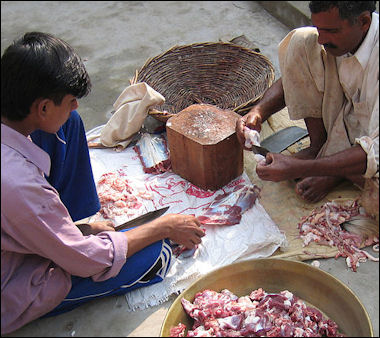
meat for the poor during Kurban bayrum “The liberal man is near the pleasure of God and is near paradise, which he shall enter into, and is near the hearts of men as a friend, and he is distant from hell; but the niggard is far from God's pleasure and from paradise, and far from the hearts of men, and near the fire; and verily a liberal ignorant man is more beloved by God than a niggardly worshiper.
“A man's giving in alms one piece of silver in his lifetime is better for him than giving one hundred when about to die. Think not that any good act is contemptible, though it be but your brother's coming to you with an open countenance and good humor.
“There is alms for a man's every joint, every day in which the sun riseth; doing justice between two people is alms; and assisting a man upon his beast, and with his baggage, is alms; and pure words, for which are rewards; and answering a questioner with mildness is alms, and every step which is made toward prayer is alms, and removing that which is an inconvenience to man, such as stones and thorns, is alms.
“The people of the Prophet's house killed a goat, and the Prophet said, "What remaineth of it?" They said, "Nothing but the shoulder; for they have sent the whole to the poor and neighbors, except a shoulder which remaineth." The Prophet said, "Nay, it is the whole goat that remaineth except its shoulder: that remaineth which they have given away, the rewards of which will be eternal, and what remaineth in the house is fleeting." Feed the hungry, visit the sick, and free the captive if he be unjustly bound.
Zakat, Welfare and Charities
Over the years, Islamic clerics have issued fatwas so that the money can be used for “good causes.” Muslim nongovernment organizations, Islamic banks and charities decide how the money should be spent. Shia give their money to their cleric mentor, who is supposed to use the money for good works, establishing madrasahs and providing stipends for theological students.
Islamic charities are involved in giving money and providing assistance to the poor, building hospitals and schools. They have also been accused of directing money to groups involved terrorist activities such as Al-Qaida. Groups like Hamas and Hezbollah are engaged in a number of charitable activities as well militant activities.
Social welfare has traditionally been taken care of the Islamic zakat system. The government also sometimes kicks in some money. Often times the governments are too poor or are unwilling to provide In many places, Islamist organizations have won supporters by providing welfare, health services, education and unemployment relief to poor Muslims in the cities and refugee camps.
On the system of social security in operation in the Muslim world in the early 14th century, Ibn Battuta wrote: "The variety and expenditure of the religious endowments at Damascus are beyond computation. There are endowments in aid of persons who cannot undertake the pilgrimage to Makkah, out of which ate paid the expenses of those who go in their stead. There are other endowments for supplying wedding outfits to girls whose families are unable to provide them, and others for the freeing of prisoners. There are endowments for travellers, out of the revenues of which they are given food, clothing, and the expenses of conveyance to their countries. Then there are endowments for the improvement and paving of the streets, because all the lanes in Damascus have pavements on either side, on which the foot passengers walk, while those who ride use the roadway in the centre". [Source: "Ibn Battuta, Travels in Asia andAfrica 1325-1354" published by Routledge and Kegan Paul, p.69, from A.S. Chughtai, Silk Road Foundation silk-road.com ||]
Image Sources: Wikimedia Commons, except Mahmoud Muhammad Taha from Afrika.org
Text Sources: New York Times, Washington Post, Los Angeles Times, Times of London, The Guardian, National Geographic, The New Yorker, Time, Newsweek, Reuters, AP, AFP, Wall Street Journal, The Atlantic Monthly, The Economist, Global Viewpoint (Christian Science Monitor), Foreign Policy, Wikipedia, BBC, CNN, NBC News, Fox News and various books and other publications.
Last updated February 2019
